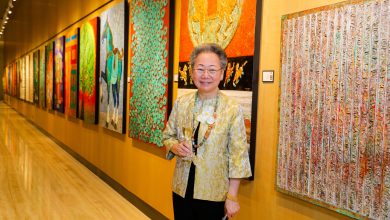A culinary student at STI-Naga bared how OFW’s children cope up with life as they grow up without physical presence of their mothers.
Elijah Faith Respicio’s piece tells tales of a child who express anger and longingness over her mother’s decision to leave the country to work abroad for greener pastures.
This resulted in missing important milestones in their lives, such as birthdays, graduations, and PTA meetings.
“Galit ako, oo, ma, galit na galit ako dahil sa araw-araw na nabubuhay ako ni minsan hindi ko naranasan na may nanay ako. Mahal mo ba talaga ako?,” she said in her piece, which won in a contest held in line with the celebration of “Buwan ng Wika”.
This scenario is common in Filipino families as 80 percent of OFWs are mothers, The Filipino Times previously reported.
But there’s always two sides to an OFW’s story.
While working abroad allows parents to make their families financial stable, some children take advantage of remittances—not knowing the hardships parents endure to be able to send significant amount of money.
“Ma, ang galing mong magpanggap. Sabi mo okay lang lahat. Ako naman, naniwala at nagpakasasa,” she said. “Ma, pasensya na hindi ko naintindihan na kailangan mong mag-sakripisyo. Hindi mo kami iniwan dahil ‘yun ang gusto mo, iniwan mo kami dahil ‘yun ang kailangan.”
At the end of her piece, Respicio commended OFWs’ sacrifices and reiterated why they deserve to be called “modern-day heroes”.
“Sila ang mga tunay na bayani na hindi kailangan ng itak, baril o kung ano pa mang sandata. Sila ang bayaning ang tanging baon lamang ay pagtitiwala, pagpupursigi, inspirasyon at pananalig,” Respicio concluded. (Video credit: Elijah Faith Geñorga Respicio’s Facebook account)
RELATED
Nay, kelan ka uuwi?

Nanay. Inay. Ina. Mama. Mommy. No matter how you call them, there’s one thing that sets them apart or rather a common denominator that makes them special – their unconditional love for their children.
Sadly, more than a million Filipino women opt to leave their families behind, seeking for greener pastures overseas. Of this figure, 80% or 984,000 are mothers.
For their children, a common experience could be the challenges with mothers so far away, like missing the biggest events in their lives, be it graduation, debut or family day at school.
But what makes it rather harder are the little things that make up a day. From getting a hug before bedtime or eating “sinigang” during the weekends, days and nights wouldn’t be the same without a mother’s touch.
These are just some of the costs of being a son or daughter of a hero.
Available figures from the Central Bank of the Philippines (CBP) and the Philippine Statistics Authority (PSA) also show that overseas Filipinas accounted for Ph61.73 billion of the Ph1.37 trillion total remittances in 2014.
A huge sum, as expected, is sent home to their loved ones, mostly children.
Tearful sacrifice
Enduring the distance between them and their children is at the core of the burden. It is an OFW mom’s tearful sacrifice while working abroad.
“Overseas working mothers grapple with homesickness and longing for their children,” said Labor Attaché Felicitas Bay.
Mothers working abroad are under constant stress, which is sometimes caused by their children back home having poor grades or even failing in school, she said.
“Teen-age pregnancy, health problems or medical conditions of their children; their kids getting into trouble or hanging out with bad company contributes to their stress at work,” Bay added.
Isabel Sy Nillas, social welfare attaché for UAE and Qatar, couldn’t agree more, adding that the usual issues she encounters during counseling also include financial problems.
“They may have been employed in the Philippines, but with a very insufficient income to support the needs of the family because their husbands or live-in partners are jobless, or they themselves are jobless,” Nillas said.
Bay said more often than not, overseas working moms “battle the challenges of work for the benefit of their children”. Another heartache, she said, is their failure to take a vacation in the Philippines because of job , and at times, financial limitations.
“Living with homesickness being away from their children, particularly the young ones – that’s how heavy it is for them,” said Nillas.
“Napakahirap at mabigat para sa isang ina ang mawalay sa kanyang mga anak,” added Bay. “Subalit ito ay tinitiis ng mga OF moms sapagkat kailangan nilang mabigyan ng maaayos na buhay ang kanilang mga anak. Nagsasakripisyo ang mga inang OFs para sa kanilang mga anak o sa pamilya kaya masakit sa kanila kung ang kanilang sakripisyo ay hindi mapapahalagahan o mapupunta sa wala.”
Psychological aspect
Nillas said OF moms also battle out anxiety, loneliness or depression. The greatest irony of this, is that household service workers (HSWs), “take care of someone else’s children while they cannot even take care of their own.”
Bay, for her part said the distance can also create a gap in the mother-child relationship. “Ang anak ay maaaring mapalayo sa ina as absence makes the heart forget; ang ina nama’y hindi na kilala ang anak lalo na kung ito ay naiwan ng bata pa during formative years at walang bond sa kanilang dalawa.”
She also cautioned mothers who make up for their absence by spoiling their kids with material things.
“Ang pinansyal o mga gadgets ay panandaliang saya lang; ang anak ay maaaring maging masaya sa materyal na bagay na bigay ng OF mom, subalit ang mother-son, or mother-daughter relationship ay hindi masusukat o mapapalitan ng materyal na bagay,” Bay stressed.
Tatagan ang loob
“Magdasal at tatagan ang loob,” Bay said is what she often advises OF moms. “Magkaroon ng constant communication sa mga anak at pamilya thru Skype, messenger and telephone calls, among others,” she added.
Bay said she likewise tells OF moms to remain good at work and try to not let their jobs be affected by family problems.
Her most important advise is to save enough money so they will not be overseas forever.
According to PSA’s 2015 report, the largest proportion of OFs belonged to age group 25 to 29 years comprising 25.8 percent, followed by those aged 30 to 34 years with 23.2 percent.



